It was a long way from the footy field, but when Port Adelaide Football Club challenged its young female Aboriginal players to climb a New Zealand mountain, they had one goal in mind.
The hiking boot stomps down in the dirt and slips slightly as the volcanic rock underfoot gives way.
Her knee has started to hurt. She steadies herself as she brings her other foot up, pauses to gather breath, grits her teeth and grimaces.
Takes another step; just keep going …
This is Devil’s Staircase, the steepest section on New Zealand’s challenging Tongariro Alpine Crossing.
At stairs’ end she will be some 1600m above sea level.
It might be late November, but significant snow fell during the night and looming ahead of this unrelenting climb are snow-capped peaks. She’s never seen snow before.
It looks too hard; just keep going …
Colleen Karpany — a 17-year-old footballer who has lived with her grandmother in Gepps Cross since she was four — is a long way from her Adelaide home.
It will take at least seven hours to trek the 19.4km of this alpine crossing, in sections clutching to jagged rocks through swirling wind, with ancient volcanic vents steaming nearby.
It’s Colleen’s first time overseas, and yet she has one thing on her mind: how this enormous walk mimics the experience of her Ngarrandjeri ancestors.
“Back in the day, our people used to walk on foot, we never had no cars, no buses, no transport … nothing,” she says. “Going for this hike, gives me a good experience of six-hours walking from one place to the destination, start to finish. That’s what’s pushing me though. I am determined to finish.”
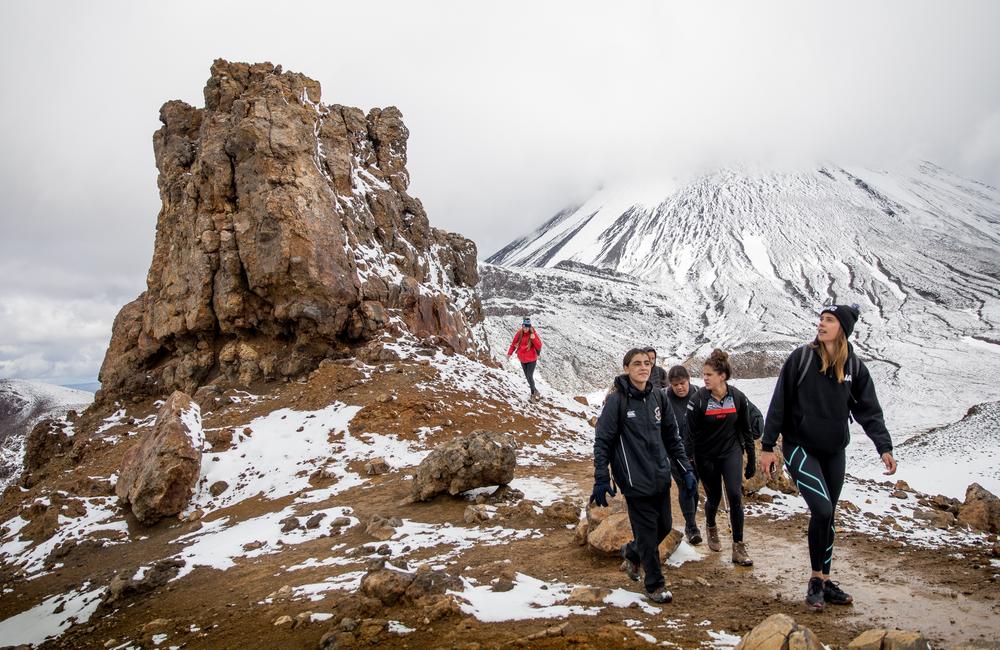
She’s not alone on this mountain; in single file behind her are fellow teenage footballers and members of Port Adelaide Football Club’s Women’s Aboriginal AFL Academy (WAAA).
They are in New Zealand on a week-long cultural exchange, aimed at pushing their physical and mental limits.
Like so many of the other young WAAA members, this trek is the hardest physical challenge they have faced and when you’re three hours into a seven-hour hike, there’s no turning back.
There’s no time for laughter or light chatter as they work to conquer this mountain. No access to Snapchat or Facebook Messenger.
It requires single-minded, internal focus.
And all along the way, there’s time to think: maybe about their families back home and their connection to their Aboriginal culture.
Maybe why there are so few indigenous role models, or how drugs and alcohol have affected their families.
And maybe how, if they can get to the other side of this mountain, they will have achieved something they never thought possible.
Just keep going …
Colleen’s teammate Shahleena Martin, is only a few steps behind. Since arriving in NZ a few days earlier, 16 year-old Shahleena has been the provider of light-relief, the team joke-teller whose hearty laugh has filled the team bus. Today, she is quiet. So too is Doreena Hansen, whose tough facade is slowly eroding.
The Tongariro Alpine Crossing is considered one of the most strenuous and beautiful single-day hikes in NZ and these girls are here to prove something to themselves on it.
They’ve spent the year at WAAA, studying for a Certificate III in Fitness, while honing their football skills and this is the end of season trip they weren’t expecting.
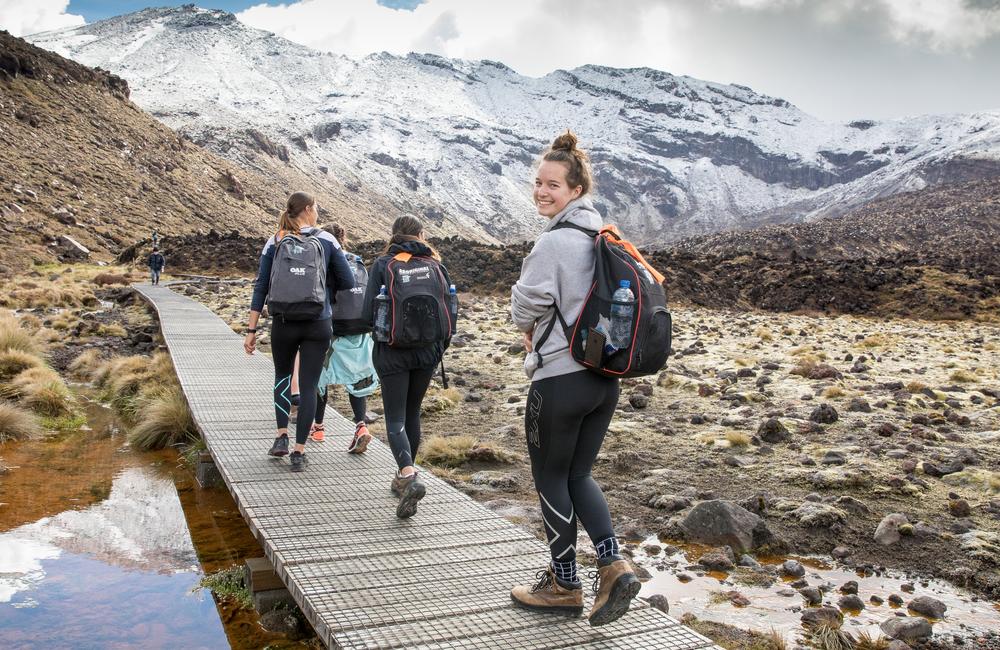
WAAA co-ordinator, Jasmine Miller, is walking alongside the girls. A teaching graduate who will commence her Masters of Education this year, she explains that the academy is open to Year 11 and 12 Aboriginal students across South Australian schools.
On Thursdays throughout term, the students head to Port’s Alberton headquarters where they study their educational component in the morning and then footy train in the afternoon under the guidance of coach Bronwyn Davey (sister of AFL players Aaron and Alwyn Davey). The educational component adds valuable SACE points to their school record.
The students can only attend the academy if they achieve a 90 per cent attendance rate at their mainstream school. And if they complete the year, they are treated with an overseas adventure — for many of the them, their first foreign experience.
Colleen and her WAAA “sisters” are the inaugural academy members. The program was launched last year and modelled on the boys’ version which has been running for five years (it has the likes of Adelaide Crow Wayne Milera and Gold Coast Sun Izak Rankine as its alumni). It is the first of its kind in the AFL.
Born in Ceduna on SA’s far West Coast and raised by her grandparents after her parents separated when she was six months old, Miller knew from an early age that she wanted to be a teacher and is passionate about the transformative power of education.
“Indigenous education is my calling I guess,” the 26-year-old says.
“So to be in the position that I am in now and to see these girls succeed it just basically blows my mind.”
The 2018 academy started with 29 students, but seven dropped out throughout the year, mainly due to personal reasons.
“We do our best to make them feel at home and make them feel comfortable so they can come to us about anything, whether it’s school, family, even just someone to talk to because a lot of them don’t have that,” Miller says.
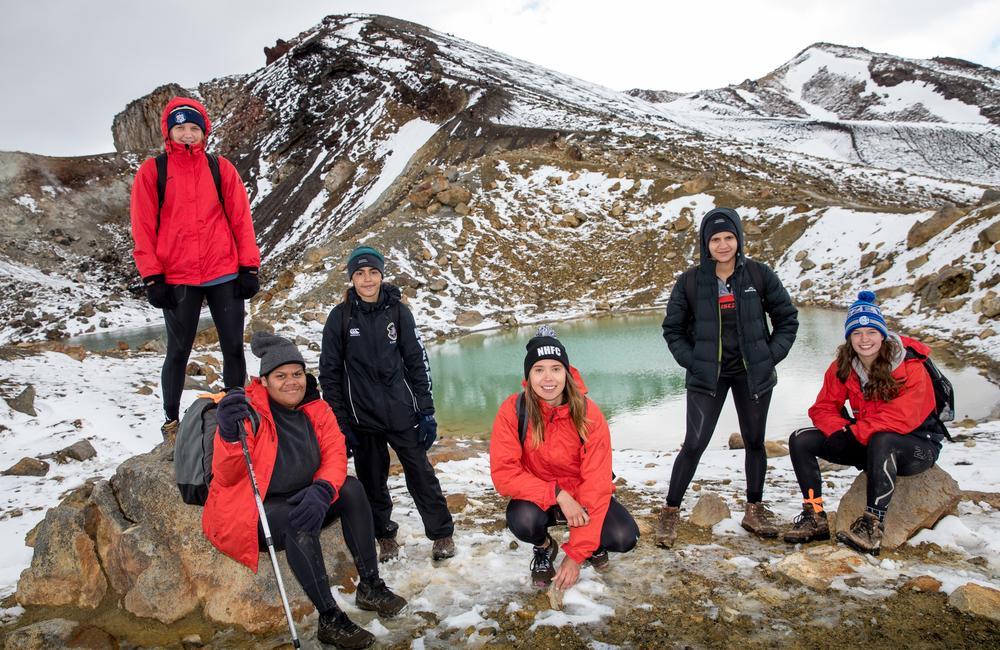
Relief at making it to the Red Crater — the highest point on the Tongariro Trek — is visible on everyone’s faces.
It’s been a tough morning and now is the time to breathe and look down at the spectacular views below: a series of rough cliffs encircling turquoise lakes. But the task ahead remains daunting. There are still three hours of a descent left to tread.
Just keep going …
Director of Aboriginal programs at PAFC, Paul Vandenbergh, 43, is a couple of steps behind the leading pack.
He’s providing an arm of support to those who are struggling. He knows first-hand the power that sport has for instigating social change.
Some of the WAAA footballers are hugely talented and are hoping to join the burgeoning AFLW. Others will not. But that’s not what’s important about this program, Vandenbergh stresses.
What’s vital is that they all finish school. Vital they go back to their communities and become the next generation of role models.
That’s because at the very heart of the WAAA program is the desire to close the gap between indigenous and non-indigenous Australians.
As Vandenbergh explains: “From my point of view: I don’t have a lawyer in my family, I don’t have a doctor in my family, I don’t have a physio in my family.
“And I think the reason why we don’t pursue those sorts of careers is because there’s no one role modelling that in our families and communities, so someone has to take the plunge, take those giants steps. It’s still sad that if I asked these girls how many people in their families have their SACE, the majority of them would say they are the first.
“In my family, I was the first to graduate and the first to get my SACE. Unfortunately it’s still pretty common in our families and in our communities.
“That’s what we’re trying to build here by having such large numbers in our programs: to create that role modelling effect where their younger siblings and cousins are seeing them … not just as sport role models. We want them to look at becoming doctors and lawyers and start having an impact back in their communities in that way.”
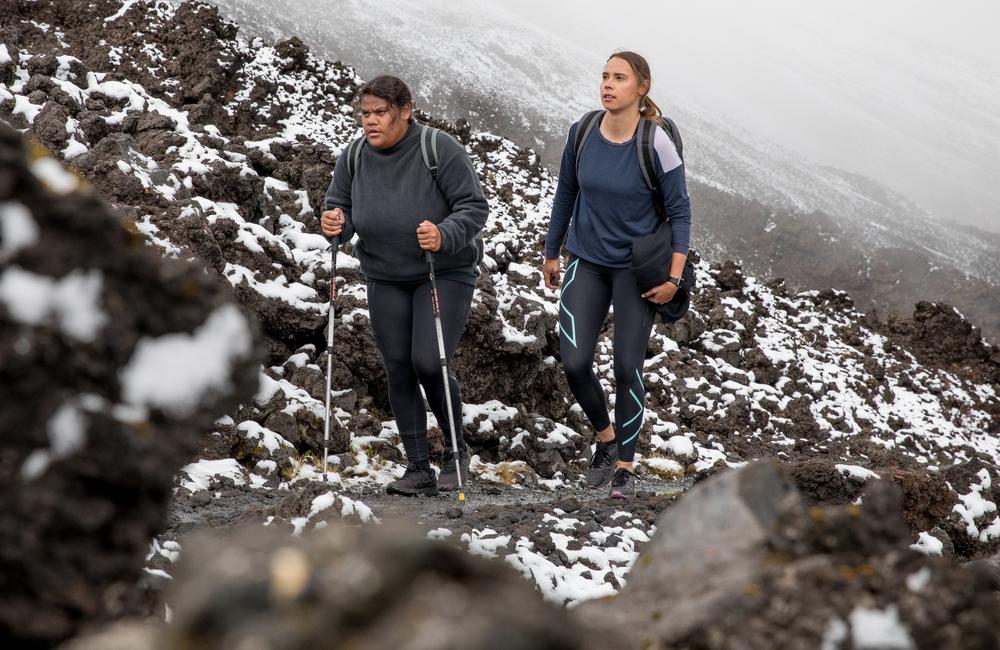
Vandenbergh enjoyed a short-lived professional basketball career, which took him from the Melbourne Tigers’ development squad to the Canberra Cannons in the NBL in 2000/01.
And that’s where he learnt the power that sport has over young people.
“Sport creates a vehicle for you to be able to have an impact between the ears,” he says. “I saw that in the NBL; kids were actually listening to what I had to say.”
And more than that, no one could see his colour.
“When you’re in your moment in sports, you’re not worried about colour … when you’re in the moment, no one really cares: we’re all the same colours for once.
“The fight that Aboriginal and Torres Strait Islander people are in right now, is we can’t do it by ourselves. There are only 750,000 Aboriginal people nationally, the fight is: how do we bring non-Aboriginal people closer to us and on the same journey? To a point where we can say: ‘We’re not here to take anything, we’re not here to take your land, or your house, I’m not here to take your job, we just want the same opportunities’.
“There is no gap if they can get to uni. That’s what the stats and data tell us: if we can get young Aboriginal people into university then there is no gap.
“But if these young people don’t finish school, then they’re on the back foot.”
And this is where both male and female versions of the academy have proved their worth: 96 per cent of members have finished Year 12 (staggering when compared with the 2018 Prime Minister’s Closing the Gap report that says 65.3 per cent of indigenous young people aged 20-24 had completed Yr 12, compared with 89.1 per cent of non-indigenous students).
Lauren Pickering, 17, was WAAA’s 2018 captain, leading her side to an almost perfect season — the team only lost one game in five.
“I had my doubts about going to uni, I thought I wasn’t smart enough,” Lauren says. “But this academy has given me heaps of confidence and now … I want to be a social worker. I just want to help in Aboriginal communities.”
Her twin sister Hayley says there are too many negative stereotypes about Aboriginal people that need to be broken down.
“ (WAAA) wants us to complete school and to get jobs and go to uni,” Hayley says.
“They are pushing us to be successful and that shows to others that Aboriginal people can do that, that we can get to high levels and do what we want with our lives.”
That the year has culminated in New Zealand is no accident.
The club has deliberately chosen this location not only for its boundary-pushing experiences — including white water rafting and sulphur bathing — but as a demonstration of how an indigenous people can embrace and be proud of its heritage and the girls experienced Maori cultural demonstrations daily.
Vandenbergh explains: “We feel like our young people can be really immersed in their culture and seeing it in NZ, how can we do that back home in Australia?”
Evelyn Goldsmith, a boundless ball of sporting energy agrees that Aboriginal stereotypes need to be challenged.
“The Maori culture here is so strong and for me that’s something I want to try to do, learn more about my own culture,” the 18-year-old muses.
“When people say: ‘I’m Aboriginal’, a lot of people think about the negative stuff rather than the good stuff. But if someone says Aboriginal to me, I just think of Eddie Betts because he’s a great player and a great role model.”
Colleen agrees: “If I knew my language (Ngarrindjeri), that would be the best thing. You walk around NZ and you say ‘kia ora’ (Maori greeting). But back in Australia, they don’t even know how to acknowledge the First People.
“When I go home I get discriminated against … I haven’t got a criminal record, but people look at my skin and they think that I’ve done something bad or that I drink every day. That’s what I don’t like about going home.”
That said, there are girls among the academy members, whose lives have been dominated by those stereotypes.
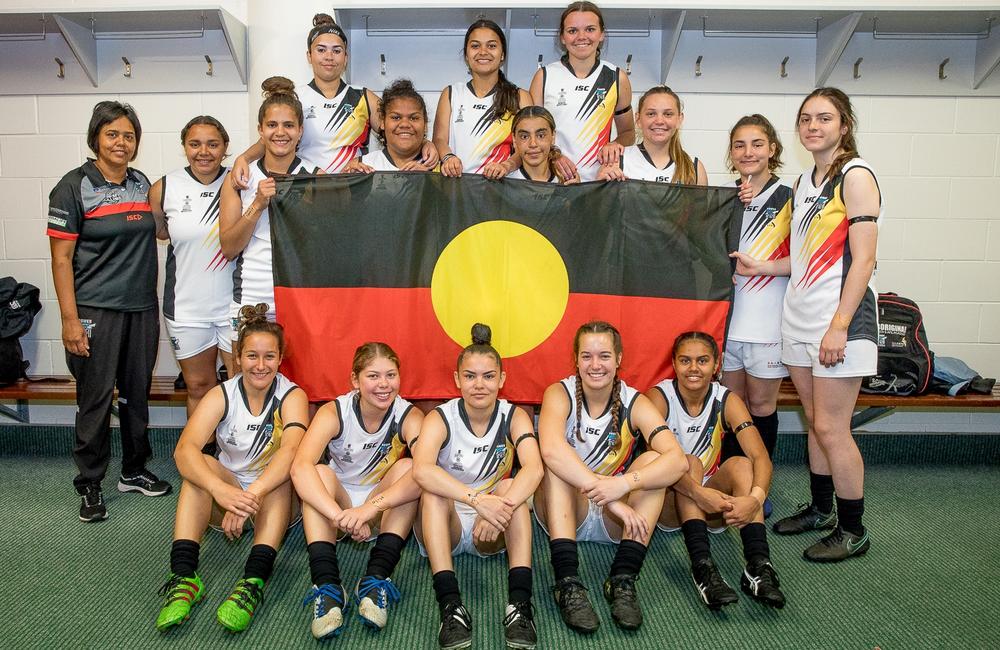
Doreena Hansen was born in Tennant Creek in the Northern Territory. Now aged 17 she talks openly about her childhood.
“Like most of the other girls — or not — I had a rough upbringing, with drugs and alcohol being fully immersed throughout a lot of my family,” she says.
“I’ve had two cousins pass away with heart problems, and violence really, just growing up around all of the alcohol and drugs and that being the reason for the violence.
“It caused massive gaps in the whole family, it was not good for younger kids, it was a bad way to be teaching the younger generation, but that’s just how it was a lot for me growing up. So I was really shy.”
At the completion of the Tongariro Crossing hike, Doreena had this to say: “Doing that walk for me, was like, life-changing to be honest. I thought about a lot of things: my relationships, friends, family, my mum, myself. I struggled walking it. A lot.
“It was really hard for me, but I felt like I had just achieved a really big thing. It was like I had achieved a really significant thing in my life. I think that was the biggest thing I’ve ever done.”
That’s exactly the aim of the trek, Vandenbergh says. Conquering this mountain should be a metaphor for life: it’s not going to be easy. “They’re going to have obstacles all throughout their lives and it’s going to be about how they deal with them: how do you dust yourself off and continue moving forward?”
Darwin-born Shahleena, 16, has been in Adelaide since Year 7, attending Scotch College and she joined the academy to “expand my social group”. “I thought if I could meet more Nunga people I’ll get more networks and connections around here and create friendships,” she says. “I’m happy being in Adelaide because it removes me from bad influences (back) there.”
A day after the trek, Shahleena is back to her laughing ways and fills the team bus once again with jokes, but climbing that mountain has left a lasting impression.
“There wasn’t much going through my head during the hike, just to go up and over the mountain,” she says. “But now that I think that I’ve done that, I’ll be fine to walk anywhere really and do anything. I feel now like the sky’s limit. From this trip, I’m going to go out more and get out of my comfort zone more. Get out and seek every opportunity.”
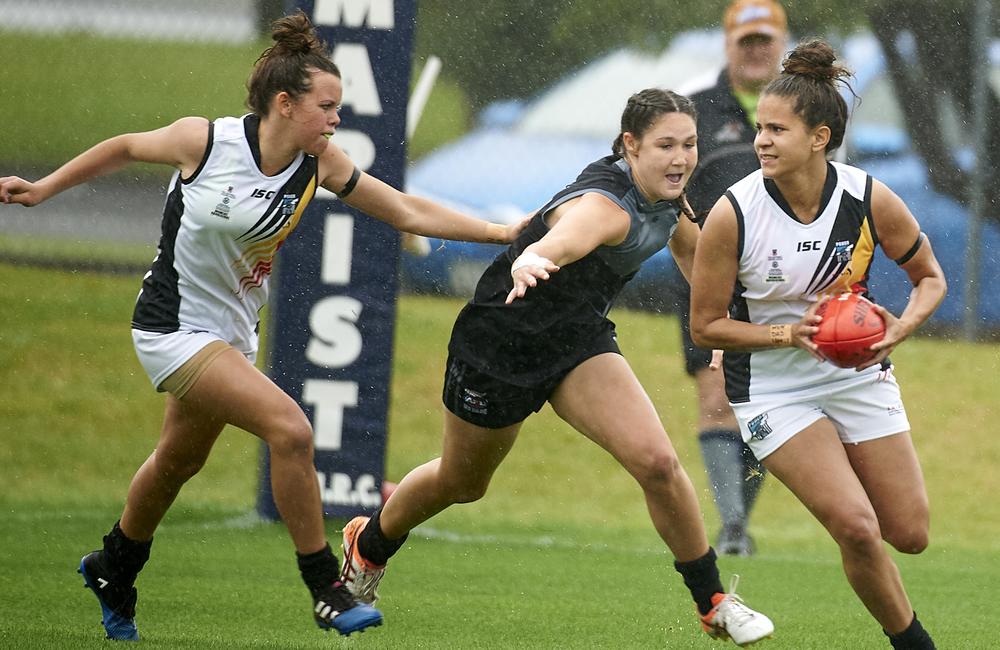
That same thing is on Colleen’s mind too: “I’m the first person in my family to go overseas,” the Avenues College student says. “These people at Port Adelaide have given me a big privilege, a big privilege.
“Before I came here I didn’t even have a birth certificate, so they got that for me and now I can do more things: I can go get my driver’s licence and get a job, open a bank account.
“There are so many opportunities they have given me now and the best one they’ve given me is to come over here and learn these fellas’ culture … it’s been deadly.
“But before, without my birth certificate or my passport, I wasn’t really looking forward to anything. But now when I go home to Adelaide, I’ve got to do something. I’ve got to get my L’s or a job. It will be good.”
Tamia Blackwell is a 17-year-old student at Woodville High. What she’s loved about WAAA is how it connects Aboriginal culture and her love of AFL. When she finishes school, she wants to get into either education or politics.
“I want to go into politics because there are not many like me; being Aboriginal and a woman, there’s not many up there representing us and our communities.”
Tamia is a dancer in Tal-kin-jeri, the dance troupe of elder Uncle Moogy — also known as Major Sumner. She sees him as a role model.
“He’s always giving us the message that there is no difference between us and non-indigenous people, but we still need to share our culture around and educate non-indigenous people, sometimes it just takes education,” she says.
“After primary school, I started at a private school and me and my sister were the only Aboriginal kids in the school and it was hard connecting with our culture there because they didn’t have cultural knowledge.
“But since moving to Woodville High, I can connect with family and my cousins there and there are Aboriginal educators there. A lot has been lost since colonisation so I’d like to keep that connection so I can teach the next generation.”
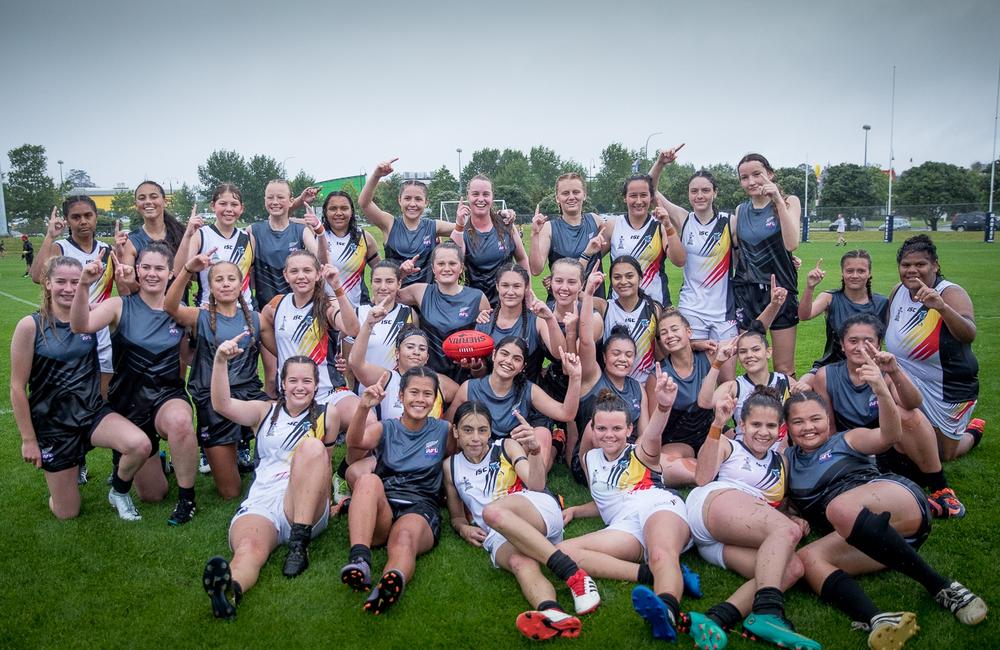
She has a rather blunt appraisal of Australia Day: “I think it’s stupid to have a day to celebrate when it’s a day of mourning and survival for us as Aboriginal people.
“There are 364 other days in the year … I read the other day, that the whole nation stops to watch a horse race, but they can’t stop to respect us Aboriginal people for our survival and how it all still affects us to this day because of intergenerational trauma. I think it’s really disrespectful.”
So what’s the biggest thing she’ll take away from her first overseas trip? “To never give up,” she says. “I didn’t think I could do that mountain, but then I did.
“And also to never judge a book by it’s cover. I didn’t know these girls and then getting to know them I’ve just seen a whole complete different side that I didn’t know was in them. It’s been great to bond and see their different side.
“Colleen didn’t use to talk to any of us, and then to see her get up yesterday and dance, oh my god, my heart felt so warm for her. She’s had a hard year, but she’s stuck it through.”
Colleen admits that she often puts up a wall in front of her, which stops her from forming friendships. This has changed since being in the academy.
“I’m more sociable, I communicate with fellas more and with football, I knew things but Aunty Bronwyn has taught me a lot — to be determined and persistent and go after the second and third efforts, I didn’t used to do that,” she says.
“But the thing I’m most taking away is how much we need to grow and start doing something with our culture and making it strong again before we lose it.”
Colleen, Shahleena, Lauren, Hayley and Tamia are all returning for their second year at the academy under the guidance of Miller. They will return to Alberton this coming week to start their football training and to study a Stage II in Aboriginal Studies.
Doreena, having finished Yr 12 at Westminster School won’t be joining them; four days after the hike she was back on a plane headed home to Tennant Creek.
“I’m sad to leave,” she says. “But I’m excited to see where I’m going. I really want to push myself to experience new things and try hard to take my life in some sort of direction.
“But there’s always doubt in my head that I’m not good enough, but that’s just how I am, I guess and that all has to do with cultural stuff, being black … just how I was brought up.
“I do want to build up what I’ve achieved this year. I want to do a barista course, a Certificate IV in Fitness and I want to a beauty course and learn make up and threading, and I want to do nutrition.”
Just keep going …
THE MOUNTAIN
■ The 19.4km Tongariro Alpine Crossing, considered one of the most beautiful — and difficult — single-day walks in NZ.
■ It is in the Tongariro National Park, NZ’s oldest national park and a dual World Heritage Site.
■ It is located on the North Island, near towns including Turangi.
■ The summit at the Red Crater is 1886m above sea level.
■ The crossing passes over volcanic terrain.
■ It takes between five and eight hours to complete with steady walking.
THE PROGRAM
■ Port’s Women’s Aboriginal AFL Academy is run in partnership with SAASTA (South Australian Aboriginal Sports Training Academy)
■ Its inaugural year was 2018 and is dedicated to the educational success of school-aged Aboriginal and Torres Strait Islander female footballers
■ Students earn 100 Stage 2 credit points towards their SACE and they receive mentoring from PAFC players, coaches and staff
■ It is delivered one day a week throughout the school terms
■ They participate in football games and training workshops as well as interstate and international travel
■ The Aboriginal language groups of the 2018 alumni are: Wirangu, Narungga, Kokatha, Ngarrindjeri, Balardung, Bardi, Arrente, Warramungu
■ In 2019, there will be 32 students attending the academy
The author travelled to New Zealand as a guest of the Port Adelaide Football Club.

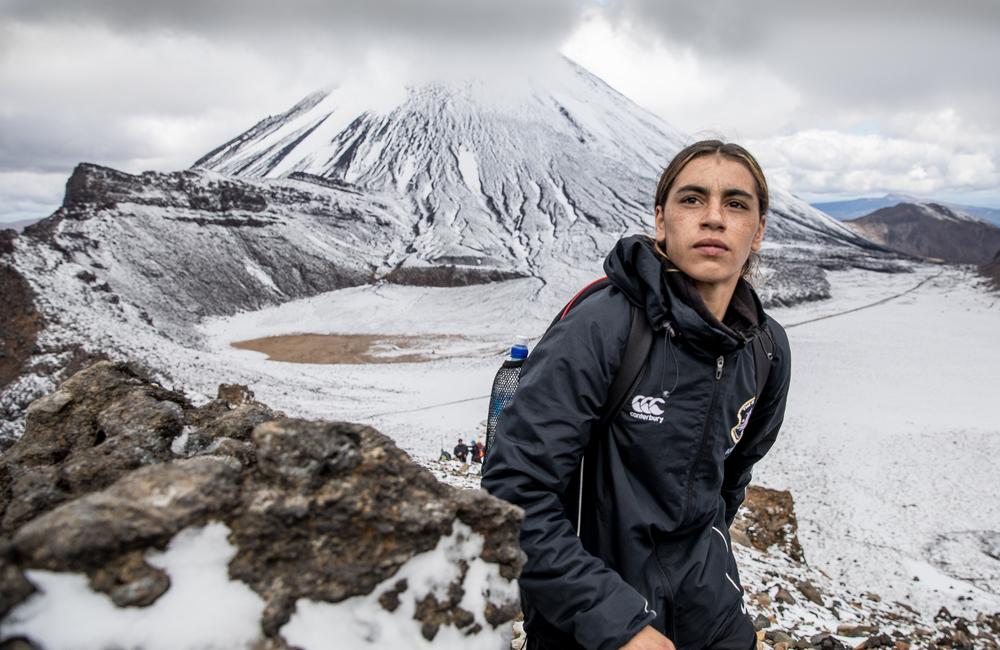

Add your comment to this story
To join the conversation, please log in. Don't have an account? Register
Join the conversation, you are commenting as Logout
Fans turn on AFLW star after ‘tone deaf’ act
Footy fans have torn an AFLW star to shreds for a ‘tone deaf’ move following North Melbourne’s grand final triumph.
The vision and pre-game address which inspired Roos to ‘lean in’
It was a glimpse into the future that Darren Crocker held on to for the entire AFLW season, only to use at the perfect time. Go inside the speech that spurred North Melbourne to the flag.